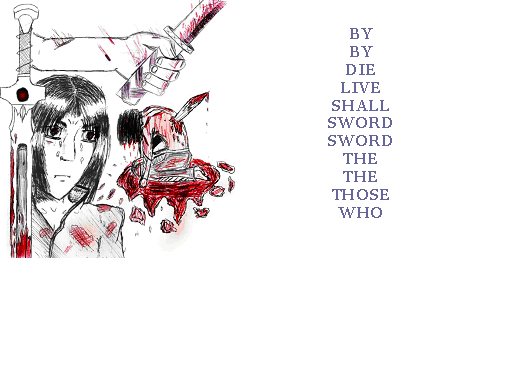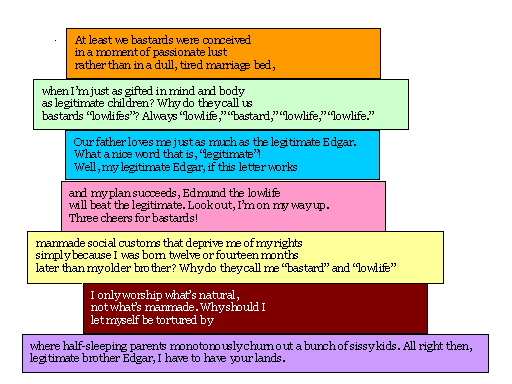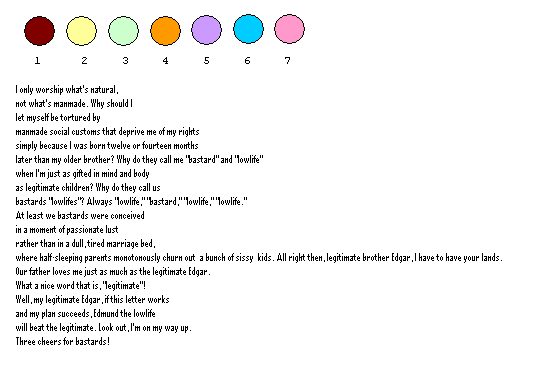|
Stand Up For Bastards!
PERIOD 5
Text Three: ďThou, Nature, art my goddessĒ (Act 1, Scene 2, ll. 1-22)
BEFORE READING ACTIVITY
THE HIDDEN PROVERB (5 min.)
AIM: to introduce the theme of verbal violence and possible consequences, to create some expectation about what is coming next. PROCEDURE: the teacher shows the picture below to the class using the over-head projector. The students try to guess what proverb is hidden in the picture, then they try to think about a possible relation between the proverb and the text they are going to read. Since students may find difficult to quote the proverb appropriately, it is provided in scrambled order.
Guess the proverb hidden in the picture.
1.Can you say it in English?
2.What does it mean?
3.Which character might it refer to? Why?
KEYS
1.ďThose who live by the sword shall die by the swordĒ.
2.It means that violent people will be treated violently themselves.
3.It might refer to Gloucester, who was very unfair to his son.

WHILE READING ACTIVITY
STAND UP FOR BASTARDS! (25 min. including oral check)
AIM: to focus on Edmundís resentful feelings and emotions, to reflect on the consequences of Gloucesterís attitude towards his illegitimate son, to discover how the secondary plot is set in motion, to make predictions about what happens next. PROCEDURE: The teacher introduces the scene by resuming what happened before. She/he explains that King Learís story is paralleled by the story of the Earl of Gloucester, who makes his first appearance at the beginning of the play, when he introduces Edmund, his illegitimate son, with dirty jokes. We do not need to see Edmundís face to imagine how often this must have happened, and how Edmundís feelings must have been hurt by it. In the following text, the students are going to learn about Edmundís reaction to his fatherís unfair words. Students work in pairs. Before doing the activity, it may be helpful to revise the following terms:
Soliloquy: it is a speech, often of some length, in which a character, alone on the stage, expresses his thoughts and feelings. Itís an important dramatic convention, because it enables a dramatist to convey direct to an audience important information about a particular character: his state of mind and heart, his most intimate thoughts and feelings, his motives and intentions.
Malcontent: the malcontent was a familiar figure in Jacobean drama; sometimes a tragic hero, e.g. Hamlet, but not necessarily so. Malcontents also appeared in comedies (Jacques in As You Like It) and as villains (Flamineo in Websterís The White Devil). Being Ďmalcontentí was fashionable in the Jacobean period. It meant being disaffected, melancholy, dissatisfied with or disgusted by society and life. Gripped by a feeling of malaise, many malcontents scorned or railed against the world of the court in particular.
Read the text and answer the following questions:
1.What does Edmund argue?
2.Why does Edmund pledge allegiance to Nature?
3.What does he intend to do? Does he remind you of any other characters in the play?
4.Whatís Edmundís purpose in this speech?
5.To what extent can we define Edmund a ďmalcontentĒ?
6.How will Edmund manipulate his father?
7.How will Gloucester repeat Learís mistake?
8.Think about the proverb mentioned before. What does it suggest to you?
KEYS
1.He argues that he possesses personal qualities that make him his legitimate brotherís equal.
2.Nature is the only force he can rely on. Because he is illegitimate, he has been denied property and power.
3.Like Gonerill and Regan, he is ready to defend his own interests.
4.To convince the audience to sympathize with his plight as bastard and to condone his plot to usurp his brother.
5.Edmund is not a true malcontent, although he shares some of the characteristics described above. He is unhappy with his position in life and on the fringes of society, which he mocks and seeks to undermine.
6.By forging a letter and making him believe that Edgar is seeking his life.
7.By trusting the wrong person. Like Lear, Gloucester will be deceived by false words and appearances.
8.This question may be difficult for some students. However, with the teacherís help, all level students should be able to predict what is going to happen. It may be useful to ask students to link Edmundís forged letter (effect) with Gloucesterís comments in the first scene (cause): Gloucesterís verbal violence will return against him in the form of a forged letter. Itís the law of cause and effect: what goes around, comes around.
SCENE II. The Earl of Gloucester's castle.
Enter EDMUND, with a letter
EDMUND
Thou, nature, art my goddess; to thy law
My services are bound. Wherefore should I
Stand in the plague of custom , and permit
The curiosity of nations to deprive me ,
For that I am some twelve or fourteen moon-shines
Lag of a brother? Why bastard? wherefore base ?
When my dimensions are as well compact ,
My mind as generous , and my shape as true ,
As honest madam's issue ? Why brand they us
With base? with baseness? bastardy? base, base?
Who, in the lusty stealth of nature, take
More composition and fierce quality
Than doth, within a dull, stale , tired bed,
Go to the creating a whole tribe of fops ,
Got 'tween asleep and wake? Well, then,
Legitimate Edgar, I must have your land:
Our father's love is to the bastard Edmund
As to the legitimate: fine word,--legitimate!
Well, my legitimate, if this letter speed ,
And my invention thrive , Edmund the base
Shall top the legitimate. I grow; I prosper:
Now, gods, stand up for bastards!
AFTER READING ACTIVITY
SPOTLIGHT ON EDMUND (25 min. including text performance)
AIM:To focus on Edmund, to analyse his language and clarify his intentions. PROCEDURE: The teacher prints out the handout below. Students are given a paraphrase of Edmundís soliloquy in scrambled order. Working in small groups (three to four) for fifteen minutes, students cut the coloured strips, put the text in order, glue it onto a piece of paper, and appoint an actor within their groups. At the end of the activity, the appointed actors perform the text, while the others vote the best performance.
Here you have a paraphrase of the original text, but unfortunately it is in scrambled order. Cut the strips, reorder the text, and act it out for your classmates.

KEYS

 5/11
5/11

|